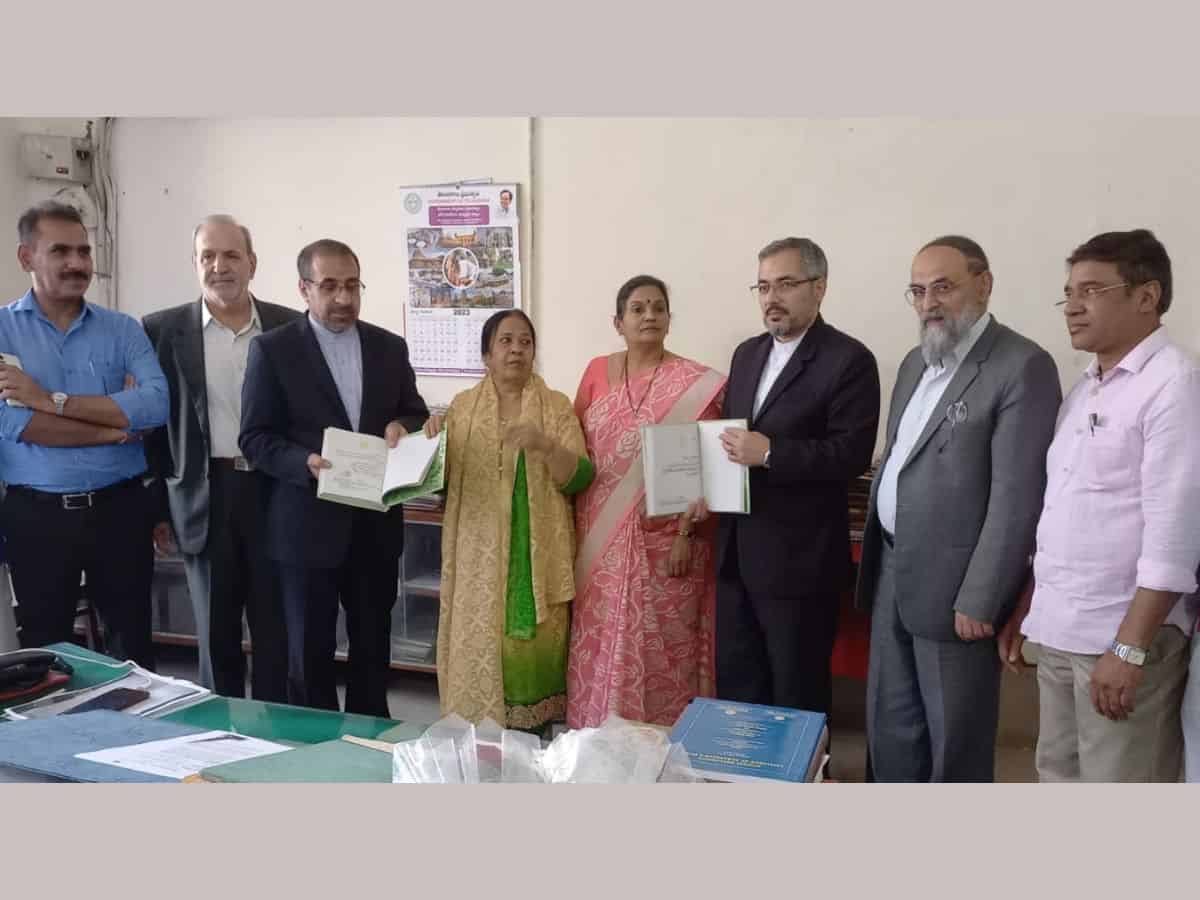
Hyderabad: Dr Irajllah, Ambassador of the Islamic Republic of Iran, New Delhi has released the first facsimile copy of the chicket book of farmans of Mir Osman Ali Khan, the seventh Nizam of the erstwhile Hyderabad state, at the State Archives.
He visited the State Archives along with the Council General of Iran at Hyderabad, Mehdi Shahrokhi, in the perspective of an initiative taken up by the Government of Iran under which Noor Microfilm International Centre (NMIC), New Delhi started the work of digitisation, conservation, and cataloguing of the old archival records, particularly in the Persian language.
NMIC Director said that the State Archives has requested that all the 355 chicket (bounded books) books of Farmans of Nizam the VI & VII and other necessary books will be made into facsimile copies for the usage of the scholars and others.
A Memorandum of Understanding between Telangana State Archives and Research Institute and the Noor Microfilm International Company, Govt of Iran was signed in the presence of IT minister KT Rama Rao, Ambassador of the Islamic Republic of Iran, Dr. Ali Chegini and Jayesh Ranjan, Prl Secretary to Government of Telangana, ITE&C Department on 7th September 2022 to take up the conservation, digitisation and cataloging work of classical Persian and Urdu language documents of no-confidential nature on a voluntary basis with no financial burden on the government treasury.
Dr Irajllah, Ambassador said, “The relationship between Iran with India has always been friendly and there are many cultural exchanges between the two countries. As Persian is our national language, we are eager to save the heritage of the Persian language in India, which was once the national language of this country too”.
The Director of State Archives Dr Zareena Parveen said, “As the records of State Archives, date back to 1406 AD, they are not of confidential nature and are largely in ornamental Persian language till 1885 AD with the quantum of several million and the NMIC has been entrusted with the work to safeguard already much brittle record to give it a new lease of life”.
She said, “The centuries-old records are becoming delicate and brittle day by day despite routine maintenance. They need professional curative treatment by experienced hands. After the conservation of the records, their longevity may increase and the glorious and precious history of Hyderabad Deccan may be secured for posterity.”
The Director of NMIC, Dr Khajapiri informed the Ambassador that so far, three lakh pages of the old Persian records pertaining to Dafter-DarulInsha, Treaties, Manuscripts (Handwritten) Books, Awarjaas (Ledgers), Baba Shah Musaafir (a Sufi Saint of Hyderabad-Deccan) & Inayat Nama (Letters), Farmans (Royal Orders) of Nizam VI & VII.
“Apart from these, the repair of brittle documents has been done under the conservation of records program. The cataloguing of the ornamental Persian records is being done simultaneously,” he said.
“There were 14 daftars of the Nizam government which will all be taken up for the said work apart from farmans, Muntakhabs, old maps and gazettes,” he added.
Later the Ambassador and Council General visited the unit with the state-of-the-art equipment and specialized manpower in the field of conservation and digitisation set up in the premises of the State Archives.
He witnessed the demonstration of the conservation method of treating old historic documents by using herbal ingredients and was very much impressed. He praised the quality of work that has been completed so far.
He appreciated the total cooperation and enthusiasm of the Archives Department as well. He was in awe of the huge quantum of records preserved in the archives when he visited the large stack area housing rare and historic documents in an impressive category.
